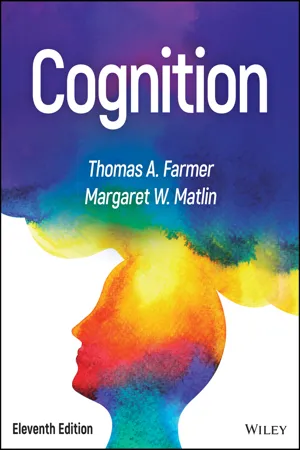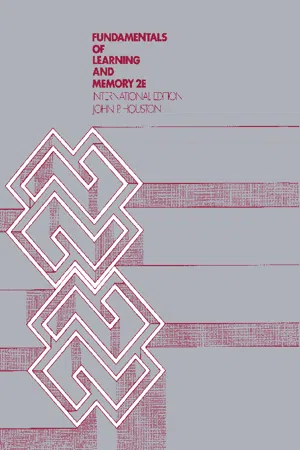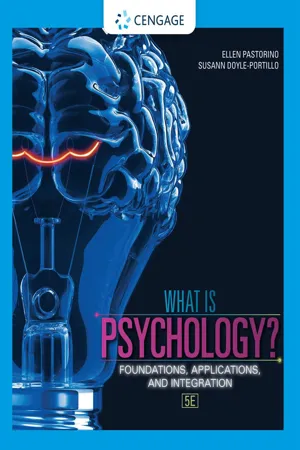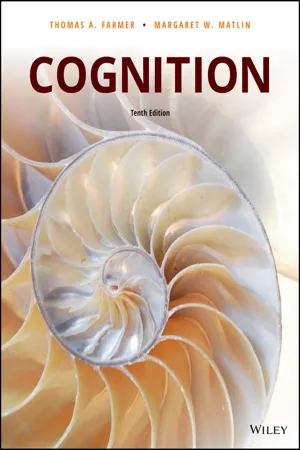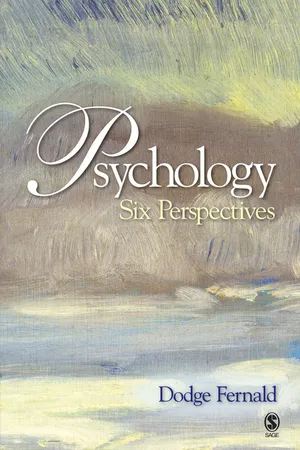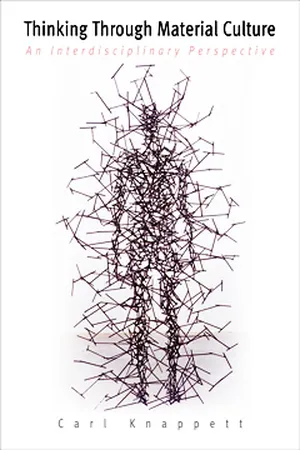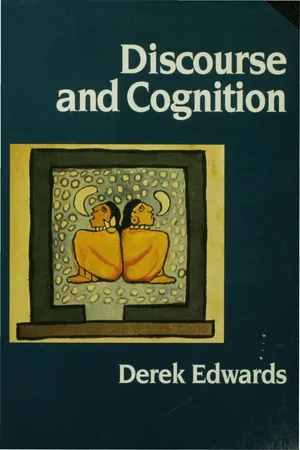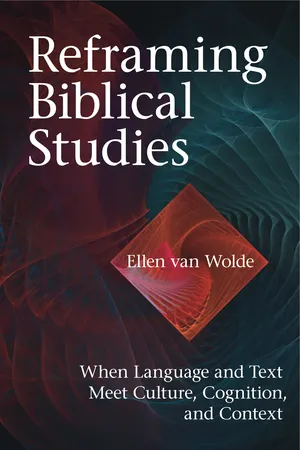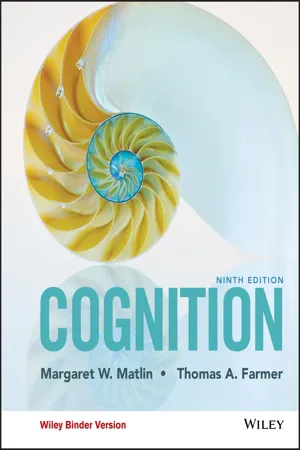Psychology
Cognition
Cognition refers to the mental processes involved in acquiring, processing, and using information. This includes perception, attention, memory, language, problem-solving, and decision-making. It encompasses the ways in which individuals understand and interact with the world around them, and is a central focus of study in psychology.
Written by Perlego with AI-assistance
Related key terms
1 of 5
12 Key excerpts on "Cognition"
- eBook - PDF
- Thomas A. Farmer, Margaret W. Matlin(Authors)
- 2023(Publication Date)
- Wiley(Publisher)
Cognitive Psychology: Overview The term Cognition, or mental activity, refers to the acquisition, storage, transformation, and use of knowl- edge. Cognition is inescapable, meaning that your cognitive processes are always at work. They grant you the ability to recognize and interpret stimuli in your environment and to react strategically to such INTRODUCTION TO COGNITIVE PSYCHOLOGY 2 information. Cognitive processes grant you the ability to plan, to create, to interact with others, and to process the thoughts, sensations, and emotions that you experience. If Cognition operates every time you acquire some information, place it in storage, transform that information, and use it . . . then Cognition includes a wide range of mental processes! This textbook will explore many of these mental processes, such as perception, memory, imagery, language, problem solving, reasoning, and decision making. As you will see throughout this book, your cognitive processes do not function in isolation from one another. Instead, they work together in intricate and highly coordinated ways to create your conscious (and sometimes nonconscious) experiences. For example, you are performing multiple cognitive tasks simultaneously as your read this paragraph. You are using pattern reCognition to create words from an assortment of squiggles and lines that form the letters on this page. You are also consulting your memory and your knowledge about language to search for word meanings and to link together the ideas in this paragraph. Additionally, right now, as you think about these cognitive tasks, you are engaging in another cognitive task called metaCognition— you are thinking about your own thought processes. - eBook - PDF
- John P. Houston(Author)
- 2014(Publication Date)
- Academic Press(Publisher)
These in-clude: 1. Cognition as information processing. Many psychologists think of Cognition as the overall process-ing of information. According to Neisser (1967), Cognition is an inclu-sive term that refers to all the proc-esses by which sensory input is transformed, reduced, elaborated, stored, retrieved, and used. Although very broad and general, this defini-tion does have value because it underlines the fact that many cogni-tive psychologists think about think-ing in terms of information process-ing. They use the language of computers. In fact, some have at-tempted to construct computer pro-grams that will simulate human thinking. These efforts usually fall under the heading of artificial intelli-gence. 2. Cognition as manipulation of mental symbols. Some psychologists prefer to think of cognitive events as the manipulation of mental symbols. As we have seen, a symbol is any-thing that stands for, or represents, something else. Therefore, when I ask you to think of a dog, and you do so, whatever it is that you are think-ing of is a symbol for dog. Symbols free us from being trapped in the present. They allow us to make excursions into the past and future. For example, when you think of the Boston Tea Party, you are visiting the past through the use of symbols. When you think about the next presi-dential election, you are moving into the future in a way which would not be possible without symbols. 3. Cognition as problem solving. As you will recall, we mentioned prob-lem solving back in Chapter 1. A problem exists when a motivated or-ganism is blocked from attaining a goal by an obstacle or obstacles (see Figure 1.5). Some cognitive psychol-ogists like to think of problem solv-ing as the essence of Cognition. They feel that Cognition refers to the ways in which we gather and use informa-tion in the pursuit of the solution to problems. Obviously, some cognitive events, such as finding the answer to a mathematical question, involve problem solving. - eBook - PDF
What is Psychology?
Foundations, Applications, and Integration
- Ellen Pastorino, Susann Doyle-Portillo, Ellen Pastorino(Authors)
- 2021(Publication Date)
- Cengage Learning EMEA(Publisher)
229 Foundations in Cognitive Psychology I n previous parts, we covered the scientific foundation of psychology and the biological systems that influence our mental processes and behavior. By now, we hope that you have developed an appreciation for the complexity and importance of our biological systems, especially our remarkable brains. Many psychologists compare the brain and the mental processes of the mind to a computer (the brain) running a software program (the mind). Like a computer, we process, store, and retrieve countless bits of information as we go about our days learning, thinking, speaking, solving problems, and so on. Collectively, these mental processes of the mind are referred to as Cognition, or the ways in which we store and use information. We engage in some form of Cognition virtually every moment of our day. We store new information as we learn new concepts and behaviors. We use information that we have previously stored when solving problems in our lives. We use stored knowledge in the form of language to communicate with others. Cognition underlies much of our behavior, making an understanding of Cognition an essential second foundation of the field of psychology. As we explore cognitive psychology in this part, we will examine what decades of scientific research have taught us about Cognition and its influence on our behavior. Chapter 6 describes how our experiences lead to learning that then affects our behavior. In Chapter 7, we will look at memory , the storage, processing, and retrieval of information in the mind. And in Chapter 8, we examine the role Cognition, language, and intelligence play in our daily lives. Cognitive abilities such as these play a critical role in our ability to function in life. Well- developed cognitive abilities may pave the way for success in life, whereas cognitive inabilities may make it difficult to meet some of life’s challenges. Both of these situations are illustrated in our case study for this part. - eBook - PDF
- Thomas A. Farmer, Margaret W. Matlin(Authors)
- 2019(Publication Date)
- Wiley(Publisher)
Additionally, we detail the large number of learning features that are built into this textbook. Their design is based on research in areas of cognitive psychology, such as human memory, and will help you to maximize the amount of information that you maintain as you read. An Introduction to Cognitive Psychology AN INTRODUCTION TO COGNITIVE PSYCHOLOGY 2 What Is Cognitive Psychology? The term Cognition, or mental activity, refers to the acquisition, storage, transformation, and use of knowl- edge. Although many have argued that nonhuman animals also have cognitive abilities, our focus here is on the inner workings of the human mind. You will likely have the opportunity to learn more about nonhuman animal Cognition in other courses offered by the Psychology and Biology departments at your university. Cognition is inescapable. At any point that you are awake, your cognitive processes are at work. They grant you the ability to recognize and interpret stimuli in your environment and to act (or react) strategi- cally to environmental input. Cognitive processes afford you the ability to plan, to create, to interact with others, and to process all of the thoughts, sensations, and emotions that you experience on a daily basis. Your cognitive abilities operate together in intricate and highly coordinated ways to create your conscious experiences. While reading this paragraph, for example, you are performing multiple cognitive tasks at the same time. In order to reach this paragraph, you used pattern reCognition to create words from an assortment of squiggles and lines that form the letters on this page. You also consulted your memory and your knowledge about language to search for word meanings and to link together the ideas in this paragraph. Addition- ally, right now, as you think about these cognitive tasks, you are engaging in another cognitive task called metaCognition—you were thinking about your own thought processes. - eBook - PDF
- Margaret W. Matlin(Author)
- 2014(Publication Date)
- Wiley(Publisher)
Furthermore, cognitive psychology is part of an active interdisciplinary area known as cognitive science. This introductory chapter also gives you a preview of the chapters in this book and an overview of five themes in cognitive psychology. The chapter concludes with some tips on how to make the best use of your textbook’s special features. INTRODUCING COGNITIVE PSYCHOLOGY At this exact moment, you are actively performing several cognitive tasks. In order to reach this second sentence of the first paragraph, you used pattern reCognition to create words from an assortment of squiggles and lines that form the letters on this page. You also consulted your memory and your knowledge about language to search for word meanings and to link together the ideas in this paragraph into a coherent message. Right now, as you think about these cognitive tasks, you are engaging in another cognitive task called metaCognition; you were thinking about your thought processes. Perhaps you made an inference such as, ‘‘This book may help me study more effectively.’’ You may also have used decision making, for instance, by saying to yourself, ‘‘I’ll finish this section of the book before I go to lunch.’’ Cognition, or mental activity, describes the acquisition, storage, transformation, and use of knowledge. If Cognition operates every time you acquire some information, place it in storage, transform that information, and use it . . . then Cognition definitely includes a wide range of mental processes! This textbook will explore mental processes such as perception, memory, imagery, language, problem solving, reasoning, and decision making. A related term, cognitive psychology, has two meanings: (1) Sometimes it is a synonym for the word Cognition, and so it refers to the variety of mental activities we just listed. (2) Sometimes it refers to a particular theoretical approach to psychology. - eBook - PDF
Psychology
Six Perspectives
- Dodge Fernald(Author)
- 2007(Publication Date)
- SAGE Publications, Inc(Publisher)
Articles and editorials in The Woman caught Cognitive Psychology —— 217 Bertha’s attention. They increased her knowledge, strengthened her under-standing, and stimulated her resistance to a problem broader than her own: the plight of women throughout society. Foundations of Cognitive Psychology In modern psychology, knowledge and understanding are known as Cognition. Thus cognitive psychology deals with knowing, understanding, and all other mental processes—including perception, memory, thinking, and numerous components of these major processes yet to be identified. Like the biological perspective, cognitive psychology is an extensive enterprise, a loose confederation of diverse interests so broad that it may seem more like a diverse subfield than a single systematic perspective in contemporary psy-chology. With the human mind as its subject of inquiry, cognitive psychol-ogy faces an immense challenge. Expressed in simpler terms that emphasize this breadth, modern cognitive psychology seeks to discover how knowledge is represented in the human mind (Mandler, 1985). Strictly speaking, cognitive psychologists study men-tal processes only, without concern for their biological background. They believe they can investigate the software, which is human cognitive ability, without substantial knowledge of how it would be implemented in the hardware, the human brain (Byrnes & Fox, 1998; Neisser, 1967). In a word, the focus is largely on consciousness—with practical applications in social behavior, school achievement, job performance, and other mental activities (Sternberg & Dennis, 1997). Cognitive psychology stands in marked contrast to radical behaviorism, which concentrates on overt actions. The cognitive approach aims to dis-cover what goes on inside the “black box,” as the human mind has been called because of its mysterious, seemingly inaccessible state. - Sarah Rundle(Author)
- 2013(Publication Date)
- Academic Press(Publisher)
*a. problem-solving (pp. 192-193) c. semantic b. conceptualization d. lexical 7. The approach to Cognition claims that Cognition activity refers to the way we absorb, manipulate, and use information to solve particular problems. a. directed thinking c. information-processing *b. probiem-solving (p. 192) d. pragmatic 83 84 CHAPTER 6 8. Some psychologists suggest that Cognition may be equated with because it includes most of the areas studied in cognitive psychology. a. conceptualization c. logical reasoning b. language use *d. thinking (p. 193) 9. Psychologists who prefer to list the factors of concern to cognitive psychology instead of defining it do not include as one of the factors appropriate for study by cognitive psychologists. a. perceiving c. learning b. remembering *d. feeling (p. 193) 10. Cognitive psychologists are interested in mentalistic concepts such as a. psychokinesis and clairvoyance. *b. ideas, thoughts, and images, (p. 193). c. static neurons and dynamic neurons. d. All of the above are mentalistic concepts of interest to cognitive psychologists. 11. When behaviorism dominated American psychology, studies tended to focus on . Cognitive psychology is, in a sense, a reaction to this limitation on research. a. physiological structures and functions b. memory and forgetting *c. observable behavior (p. 248) d. sensation and perception LANGUAGE 12. Which of the following best expresses the comparison between the language use of animals and the language use of humans? a. As we go from lower to higher animals, including humans, there is a continuous improve-ment in the ability to use some form of language. b. Animals use actions and gestures rather than words, so it can be said that only humans use language. *c. Language use in animals is limited to a few basics while humans have complex language systems, (p. 194) d. There is evidence to suggest that the language systems of some animals are almost as complicated as human language systems.- Lorelle J. Burton, Drew Westen, Robin M. Kowalski(Authors)
- 2022(Publication Date)
- Wiley(Publisher)
Pdf_Folio:19 CHAPTER 1 Psychology: the study of mental processes and behaviour 19 The cognitive perspective is useful not only in examining memory but also in understanding processes such as decision making. When people enter a car showroom, they have a set of attributes in their minds: for example, smooth ride, sleek look, good fuel economy, affordable price. They must also process a great deal of new information (the car dealer’s description of one model as a ‘real steal’, for instance) and match it with stored linguistic knowledge. This allows them to comprehend the meaning of the dealer’s speech, such as the connotation of ‘real steal’ (from both his viewpoint and theirs). In deciding which car to buy, they must somehow integrate information about multiple attributes and weigh their importance. As we will see, some of these processes are conscious or explicit, whereas others happen through the silent whirring of our neural ‘engines’. APPLY AND DISCUSS A four-year-old is about to grab a lolly off the shelf at a shop, and his older sister says, ‘No, don’t take that. That would be stealing’. • How would a psychologist from a behaviourist perspec- tive explain both children’s behaviour? How did their learning history shape their actions? • How would a psychologist from a cognitive perspective explain their behaviour? What made the four-year-old think that inside this lolly wrapper would be something tasty? How did the older child learn to resist such temptations and to view stealing as wrong? Origins of the cognitive perspective The philosophical roots of the cognitive perspective lie in a series of questions about where knowledge comes from that the ancient Greek philosophers first raised and that British and European philosophers pondered during the last four centuries (see Gardner, 1985).- eBook - PDF
Thinking Through Material Culture
An Interdisciplinary Perspective
- Carl Knappett(Author)
- 2010(Publication Date)
- University of Pennsylvania Press(Publisher)
Chapter Cognition, Perception, and Action Rethinking Cognition It was apparent in the last chapter that biologists have tended to focus on individual organisms independently of their physical environment; much the same can be said of cognitive scientists, in their propensity for isolating internal mental states in explaining cognitive phenomena (Clark , ). The upshot is that ‘‘mind’’ is still very commonly treated as a domain sepa- rate from the body and the world, not only in cognitive science but also in much psychology and in cognitive anthropology. In the pages that follow we shall critique this tendency, and propose an alternative perspective that links together Cognition, perception and action much more fluidly. It is an approach that depicts Cognition as a distributed, situated, and embodied process. The common view to which we are reacting portrays the human body as the passive receptor of an array of stimuli from the environment, stimuli that are detected through various sensory modes (perception). The rather jumbled information embodied in these stimuli is then channeled through to the brain, imagined to operate as a kind of central processing unit. The information reaching the brain is duly processed and internalized; this op- eration allows for the information to be interpreted and given meaning. In interpreting this information, the mind creates a set of representations that allow for the formulation of an appropriate behavioral response, which is then conveyed to the body and enacted in the external environment. The feedback between external world and internal mind may be rapid and con- tinuous, but world and mind nonetheless remain separate. Some key tenets of this perspective are that the cognitive processes of the mind are of a higher order; that Cognition is an internal process, separate from the exter- nal world of perception and behavior; and that perception is somewhat ‘‘dumb,’’ unguided, and passively responsive to stimuli. - eBook - PDF
- Derek Edwards(Author)
- 1996(Publication Date)
- SAGE Publications Ltd(Publisher)
Cognition, like any other object of academic study, is brought into being by us, as soon as we start to define its nature and scope . That suits the rest of my argument, of course, in that Cognition is already, before we have got very far, clearly a cultural and discursive matter. History and rhetoric of cognitive psychology The notion that cognitive psychology is an academic enterprise like any other, whose business is to construct its object or topic, rather than simply and neutrally 'finding ' it, leads us to consider cognitivism historically. For example, David Hamlyn argues that cognitive psychology inherited some arbitrary and inadequate features of behaviourism, which it was designed to counter and replace, precisely because it was designed to counter and replace it. Specifically, it inherited a notion of 'human beings and animals as a kind of box with input and output' (Hamlyn, 1990: 8). In some respects, cognitive psychology is not as distant from stimulus-response (S-R) behaviourism as its proponents made out. While it replaces non-mentalism with mentalism , it retains the mechanistic notion of mind as an input-output conversion device, where the path between input and output is traced as information flow rather than S-R connections. In the classic text Plans and the Structure of Behavior (Miller, Galanter, and Pribram, 1960), the cognitive perception-and -action feedback unit TOTE (Test-Operate-Test -Exit) was explicitly designed to replace the S-R reflex arc as the basis of psychological explanation. In the same way, Chomsky's (1965) 'Language Acquisition Device' (LAD), an innate mechanism that converts linguistic input (what the child hears) into linguistic competence, was formulated as an alternative to Skinner's behavioural conditioning model of language learning. - eBook - PDF
Reframing Biblical Studies
When Language and Text Meet Culture, Cognition, and Context
- Ellen Van Wolde(Author)
- 2009(Publication Date)
- Eisenbrauns(Publisher)
- 22 - Chapter 2 Mental Processing or Cognition The flow of events performed by the brain, the active and structuring character of which extends to both perception and Cognition, is commonly called mental processing. It is the complex of neurological, ultimately electro- chemical events that constitute mental images in the brain. In an interview in the newspaper De Volkskrant (26 October 2005), the fa- mous Dutch artist Jan Wolkers gives a good illustration of a mental image. While showing his newest painting, a diptych meticulously made of dots, dashes and brushes, he asks the interviewer: “What does it represent? Sometimes I would say: these are the dunes, this is the sea, or this is snow. But actually, they are not. They refer to my head’s inside. They are the im- ages—of dunes, snow and sea—that have stuck in my memory.” Paintings, films, words, and thoughts are not direct representations of the world around us. They are influenced and constituted by mental activities. Some of the mental images are like those sketched by Jan Wolkers. They are the result of perceptual experiences that depend on stimuli impinging on the sense organs and on the structure imposed on them at more-central lev- els of processing in the brain. Other mental images are based on cognitive stimuli only and are the result of cognitive activities in the mind. In both cases, mental processing is not merely an individual procedure but a perfor- mance in accordance with current expectations in a culture and its available 2.1. Cognition, categories, and culture . . . . . . . . . . . . . . . . . . . . . . . 23 2.2. Cognition, embodied mind, and experiential realism . . . . . . . . 28 2.3. Cognitive Linguistics . . . . . . . . . . . . . . . . . . . . . . . . . . . . . . . . . . 29 2.4. Cognitive Grammar: Symbolization and coding . . . . . . . . . . . . 34 2.5. Cognitive Grammar: Grounding and integration . . . . . . . . . . . 38 2.6. Summary . . . . . . . . . - eBook - PDF
- Margaret W. Matlin, Thomas A. Farmer(Authors)
- 2016(Publication Date)
- Wiley(Publisher)
Many review questions ask you to apply your knowledge to an everyday problem. Other review questions encourage you to integrate information from several parts of the chapter. Thinking about each question will provide you with another opportunity to identify the areas in which you may have dificulty with the material. Keywords. Notice that each new term in this book appears in boldface type (e.g., Cognition) when it is irst discussed. I have included the deinition in the same sentence as the term, so you do not need to search an entire paragraph to discover CHAPTER 1 An Introduction to Cognitive Psychology 32 1) Which of the following statements is true about Cognition, in connection with the themes of this textbook? a) Most cognitive processes can be studied in isolation, without reference to other processes. b) Although some cognitive processes are active, most are passive. c) Most cognitive theories propose that humans actively examine the world for information. d) Cognitive processes handle neutral information better than positive information. 2) Suppose that you are accustomed to a certain bus stopping on a speciic corner near your college campus. A bus stops, and you think that it’s your customary bus. You fail to notice that the side of the bus has a totally different company name. The process that led to your misidentifying the bus is called: a) serial processing. b) parallel processing. c) bottom-up processing. d) top-down processing. the term’s meaning. Also, notice that phonetic pronunciation is provided for a small number of words that are often mispronounced. Students tell me that they feel more comfortable using a word during class discussion if they are conident that their pro- nunciation is correct. (I also included pronunciation guides for the names of several prominent theorists and researchers, such as Wundt and Piaget). Keywords List and Glossary. A list of new terms appears at the end of each chap- ter.
Index pages curate the most relevant extracts from our library of academic textbooks. They’ve been created using an in-house natural language model (NLM), each adding context and meaning to key research topics.
